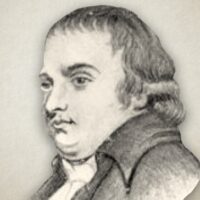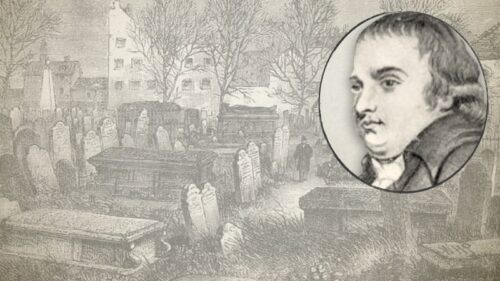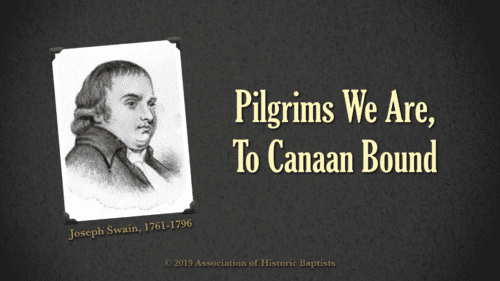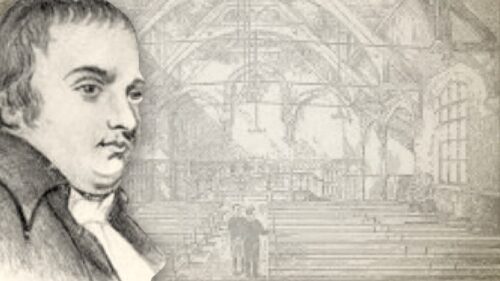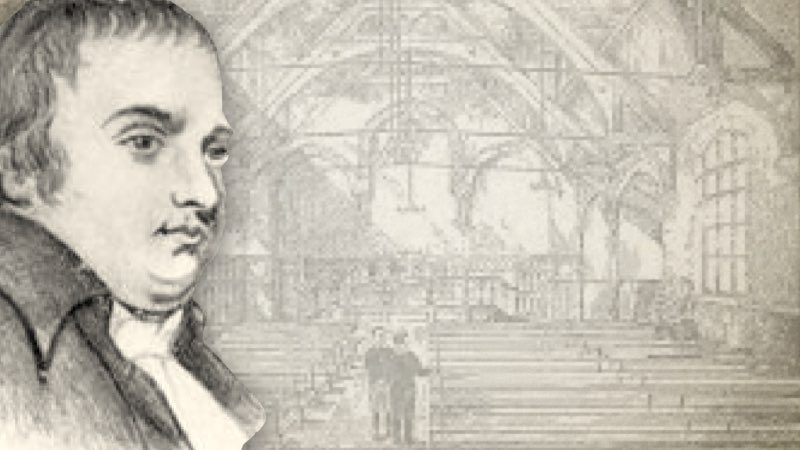
The Life And Legacy Of Joseph Swain
The Sower 1896:
The Centenary Of His Death
This useful and worthy Baptist minister died very young, like the immortal Toplady, but the work of many years was pressed into a few, and the Lord used and honoured his instrumentality to the conversion of many souls; and though a century has elapsed since his death, his seraphic poem on “Redemption,” with many of his precious, animating hymns of praise, with other works, serve to keep his memory fresh in the minds of God’s people. He was born at Birmingham in 1761, and left an orphan at an early age. He was apprenticed to an engraver in his native place, but before he had finished his term he left and removed to London, where he had a brother in the same business. Here he became acquainted with a circle of gay and thoughtless youths, and being himself naturally of a lively, cheerful disposition, his company was much sought, and he was led into many follies and excesses. In the midst of these vanities it occurred to his mind that he was neglecting the Holy Scriptures, that he was on the road to destruction, and that his end would be miserable, He therefore purchased a Bible, his conviction of sin increased, and his conscience was greatly alarmed with apprehensions of eternal ruin. When twenty-one years of age, he writes thus in his diary:—”I was followed for about six months or more with dreadful ideas of eternal torments, and particularly in the night season, fearing lest by fire or sickness, or some other means, I might be removed into the endless fire of hell. These things, however, were not effectual to cause me to leave my worldly acquaintances and sinful practices. For I still found that I loved my sins and was not able to give them up, though I feared the punishment due to them. After a long succession of these things, together with many legal workings and various attempts to make my own peace with God, on April 2nd, 1782, as I was going with my companions in sin to a place of entertainment, I felt my heart gradually melted into love. I then attempted to seek God by prayer, and was assisted with such a spirit of supplication, as till then I was a stranger to. I then had many passages of Scripture brought to my remembrance, wherein I saw myself as a sinner, and Christ as a Saviour. Yea, I saw and believed that He died for me, and that I should soon be with Him in glory at the right hand of God. And oh, how did my enraptured soul rejoice in this great salvation at this time! So great were the peace and satisfaction I enjoyed, that I thought I could bear to be confined in the darkest dungeon for ever, provided I might always feel what I then felt of the presence of God in my soul. But ah! the heavenly vision was not to continue always, as I soon found by experience; for some time afterwards a kind of coldness seized my frame, and almost on a sudden the heavenly scene was snatched away, and I was left with little more than the remembrance of it.”
He had been used to compose songs, but now he began to compose hymns for his own use. When he was singing one of these, a person who had been used to attend an evangelical ministry took notice of it, and asked him whose hymn it was, to which he replied, “It is one of my own.” The person invited him to go with him to Spa Fields Chapel, where he heard Mr. Wills, which was the first evangelical sermon he had ever heard. On being asked how he approved the sermon, he replied, “I am sure what the preacher said is true, for he hath described my feelings better than I can myself.” He was advised to hear Mr. J. Rippon, and found his ministry much blessed to his edification. After having attended a considerable time and formed a friendly acquaintance among the people, he was desirous of.being baptised and of joining the Church. He publicly professed his faith in Christ, and was baptised on May 11th, 1783. Once after hearing dear old John Berridge preach about this time he was so filled with the love of Christ that he said to his wife, “My dear, I do think I shall die with joy.”
In His Diary He Thus Writes:—
“October, 1783, a very exceeding sweet and powerful manifestation to my soul in private, having this good word for my encouragement. ‘Resist the devil, and he will flee from you: draw nigh to God, and He will draw night to you.’ I think if ever I tasted solid satisfaction of soul in God, it was at this time—almost as full as an earthen vessel could hold. I scarce knew how to leave the throne of grace. I was constrained to cry out, ‘What shall I render unto the Lord for all His benefits’? and here I am sure I did desire to take the cup of salvation, and with redoubled ardour call on the name of the Lord. Yea, it was my desire to commit soul, body, spirit, with all that appertains thereunto, into the hand of my faithful God and Father, for time and for eternity. My assurance of the eternal enjoyment of Jesus my Redeemer in heaven, with all the redeemed, was almost, I think, as clear as though I had seen the celestial gates stand open, and all the glorious spirits waiting to receive and welcome me home to my Father’s house.”
In the beginning of 1784 he began meeting with friends at his own house for prayer, and for the mutual communication of Christian experience. The opportunities thence arising were edifying to many, who remember with pleasure those useful and solemn seasons. At length the Church to which he belonged, believing him to have gifts for the ministry, gave him a call to preach the Gospel, which call was attended with an extraordinary prayer-meeting on his account, in the month of June, 1791. He was invited to preach at Walworth; his labours were abundantly owned of God, for in a little time he had many seals to his ministry. The December following a Church was formed of twenty-seven members, he was ordained over them as their pastor on February 8th, 1792. In this new relation he gave himself up to the service of Christ with all his heart, and God was with him, for many believed and were turned unto the Lord. On account of the increased auditory, the meeting-house was enlarged three times, and in the space of four years the number of Church members was upwards of two hundred.
He felt the solemn responsibilities of the ministerial office, as one or two remarks from his diary testify:—1795, “I have been much exercised of late for fear I should get at a distance from God, and so be the means of half starving the flock. Oh, what solemn work is the work of the ministry. Fresh discoveries of my own depravity and infirmities sometimes shake my hopes to the root; yet I must say, if the work of Christ in His vineyard and the enjoyment of His salvation are not my chief concern, I know not what is.” I was constrained to be earnest in prayer for the Lord’s help, and He enlarged my heart and my steps under me. I think I have tasted more bitter herbs lately than usual, but I have also enjoyed some sweet moments in hoping to reap in due season,” &c.
“This has been a solemn week in visiting the dying. Three brethren are probably near eternity. Lord, enable me to profit myself and others by their experience, and uphold them in sickness. Mr. Romaine, and Mr. Clark of Exeter, are also lately fallen asleep. All these voices call to me, saying, ‘Be thou also ready,’ and yet what a cleaving to earth and earthly things do I still find. Mr. Bently, of Camberwell, is also fallen asleep in Jesus. I hear that he died very happy. Lord, grant that I may live the life and die the death of the righteous. A little while ago Dr. Stennett died, and since their decease the aged Mr. Benjamin Beddome departed, besides many other Gospel ministers, this last summer.
“Heaven draws my spirit towards its blissful shore,
And bids my heart to things eternal soar;
From what strange cause springs this peculiar strife?
I long to die, yet still am fond of life.
“I bless the Lord who lends me vital breath,
Yet leap for joy at thought of certain death;
When I look round, how many objects dear
Fix on my eye and gain upon my ear,
“But when the Lord himself with power
Displays his glories in some favoured hour;
When love appears supreme upon the throne,
And points the soul to its immortal crown;
“Loose fly the strings which hold my heart to earth,
Up spring the passions of celestial birth;
And one bright glance of Jesus makes me say,
‘I’ve none on earth; in heaven I’ve none but Thee.'”
The passages relating to his last illness are taken from his funeral sermon, by Mr. James Upton, of the Baptist Church, Blackfriars Road:—
“He appeared much concerned for and in prayer about the church. Two of Dr. Watts’ sermons were read to him, and he expressed great pleasure in hearing them. He said they had been the means of his enjoying some nearness to God in prayer. On Thursday evening he had a violent fit, which left him apparently senseless for some hours; but when he came to himself, on Mrs. Swain entering the room, he said ‘Oh, my dear, I have been offering some petitions to God for you, which I am sure will be answered. I am sure they will be answered.’ On Saturday he said to her, ‘I have made a mistake; I thought I was getting better, but I now feel I am very bad; I have been seeking the Lord about my case, and can get no other answer than this, ‘Get thine house in order, for thou shalt die and not live.”’ On seeing her much affected, he said, ‘Oh, my dear, don’t grieve. The Lord can make you a happy widow. You were happy in the Lord before you knew me, and He can make you happy when I am gone.’ He then exclaimed, ‘Oh, my dear Redeemer! am I coming to Thee so soon? ls my work done? It is just fourteen years since I first knew Thee, Lord! If it were Thy will, I should rejoice to labour a little longer with the dear people. Yet not my will, but Thine be done.'”
After being greatly afflicted for twelve or fourteen days, he was received into the bosom of eternal bliss on April 14th, 1796, aged thirty-six years. Three verses of one of his own hymns express his felicity—
“Oh, how the thought that I shall know
The Man that suffered here below,
To manifest His favour
For me and those whom most I love,
Or here, or with Himself above,
Do my delighted passions move
At that sweet word, for ever!
“But how must His celestial voice
Make my enraptured heart rejoice,
When I in glory hear Him!
While I before the heavenly gate
For everlasting entrance wait,
And Jesus on His throne of state
Invites me to come near Him.
“Come in, thou blessed, sit by Me,
With My own life I ransomed thee;
Come, taste My perfect favour.
Come in, thou happy spirit, come;
Ye blissful mansions, make him room,
For he must stay for ever.”
His remains were deposited in Bunhill Fields burying-ground, his funeral being attended by some thousands of people, who were all greatly affected. Abraham Booth, Dr. Rippon, and James Upton conducted the solemn services and preached the funeral sermons. I believe the Church over which he presided exists at the present time, and still maintains, by God’s grace, those distinguishing truths upon which it was at first established.
Joseph Swain (1761-1796) was a Strict and Particular Baptist preacher and hymn-writer. In 1792, he was appointed pastor of the Baptist church meeting on East Street, Walworth, a position he held until his death.



